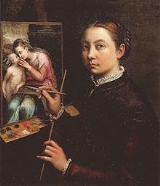
Sofonisba Anguissola
Overview
Sofonisba Anguissola (c. 1532 – November 16, 1625) was an Italian
Italy
Italy , officially the Italian Republic languages]] under the European Charter for Regional or Minority Languages. In each of these, Italy's official name is as follows:;;;;;;;;), is a unitary parliamentary republic in South-Central Europe. To the north it borders France, Switzerland, Austria and...
painter of the Renaissance
Renaissance
The Renaissance was a cultural movement that spanned roughly the 14th to the 17th century, beginning in Italy in the Late Middle Ages and later spreading to the rest of Europe. The term is also used more loosely to refer to the historical era, but since the changes of the Renaissance were not...
.
Sofonisba Anguissola was born in Cremona
Cremona
Cremona is a city and comune in northern Italy, situated in Lombardy, on the left bank of the Po River in the middle of the Pianura Padana . It is the capital of the province of Cremona and the seat of the local City and Province governments...
, Lombardy
Lombardy
Lombardy is one of the 20 regions of Italy. The capital is Milan. One-sixth of Italy's population lives in Lombardy and about one fifth of Italy's GDP is produced in this region, making it the most populous and richest region in the country and one of the richest in the whole of Europe...
around 1532, the oldest of seven children, six of whom were daughters. Her father, Amilcare Anguissola, was a member of the Genoese minor nobility. Sofonisba's mother, Bianca Ponzone, was also of an affluent family of noble background.
Over four generations, the Anguissola family had a strong connection to ancient Carthaginian history and they named their offspring after the great general Hannibal, thus the first daughter was named after the tragic Carthaginian figure Sophonisba
Sophonisba
Sophonisba was a Carthaginian noblewoman who lived during the Second Punic War, and the daughter of Hasdrubal Gisco Gisgonis...
.
Amilcare Anguissola encouraged all of his daughters (Sofonisba, Elena, Lucia, Europa, Minerva and Anna Maria) to cultivate and perfect their talents.

